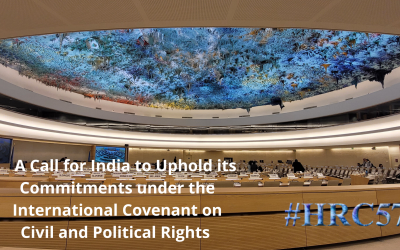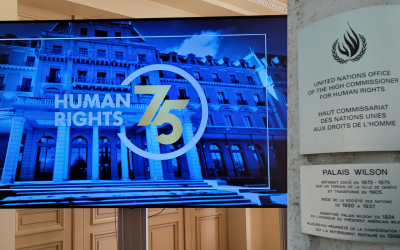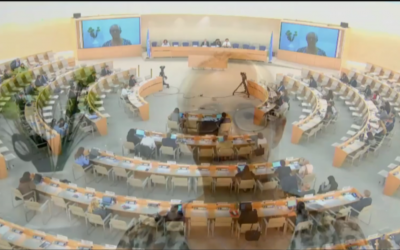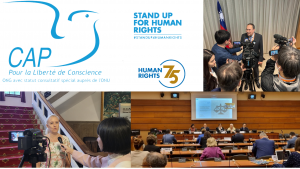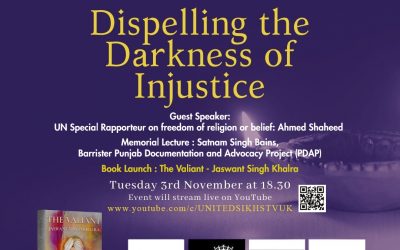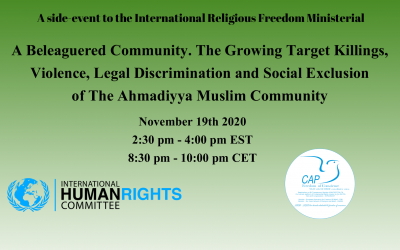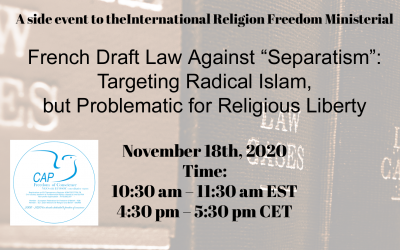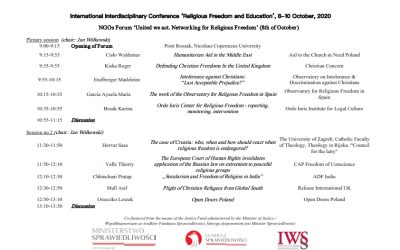
What is “Coordination des Associations et des Particuliers pour la Liberté de Conscience” (CAP Freedom of Conscience)?
CAP Freedom of Conscience is a secular European NGO with United Nations Consultative Status, created in 1995 and dedicated to protect the Right of Freedom of Religion and Belief.
CAP Freedom of Conscience combats all forms of discrimination based on religion or belief by alerting European and International bodies.
CAP Freedom of Conscience collects testimonies of discrimination and human rights violations affecting religious or belief communities in order to disseminate them to international bodies, and in order to raise awareness and inform them as well as to generate debate on the protection of Freedom of Religion and Belief.
CAP Freedom of Conscience also advocates for any religious or spiritual group facing discrimination to have their right to Freedom of Religion and Belief recognized.
CAP Freedom of Conscience is a member of the European Federation for Freedom of Belief (FOB), European Network Of Religion and Belief (ENORB) and participate to the Civil Society Platform of Fundamental Rights created by the EU Fundamental Rights Agency DAFOH Partners in Combating and Preventing Forced Organ Harvesting
HRC 57 Writtten Statement India is being encouraged to protect political rights in the face of violations
CAP Liberté de Conscience has urged the government to tackle its persisting human rights abuses and uphold its obligations outlined in the International Covenant, on Civil and Political Rights (ICCPR) according to a written statement presented at the United Nations Human Rights Council 57th session.
CCPR – International Covenant on Civil and Political Rights 142 Session FRANCE
The report by Human Rights Without Frontiers (HRWF) and CAP LC presented to the 142nd session of the UN Human Rights Committee paints a disturbing picture of the treatment of Romanian yoga practitioners by French authorities in the aftermath of wide-scale police raids in November 2023.
57th Session of the Human Rights Council Arbitrary Detention UAE
It is essential that the recommendations of the Working Group are implemented without delay, including:
Remedying the situation of the individuals who are arbitrarily detained
Ensuring compensation and reparations
Holding accountable those responsible for violating their rights
Amending legislation that allows the extension of sentences already served which violates the principle of legality and non-retroactivity
Encouraging all States to cooperate with the Working Group
HRC 57 Azerbaijan: 11 Members of the Ahmadi Religion of Peace and Light Persecuted for Sharing their Faith
Recently, in Azerbaijan there has been a trend of intolerance where 11 followers of the Ahmedi faith were arrested for openly practicing their beliefs as members of the Religion of Peace and Light.
Side event to the 57th Human Rights Council, Geneva Arbitrary Detention in the UAE: Addressing the Crisis of Civil Society Suppression
In a conference titled “Arbitrary Detention in the UAE: Addressing the Crisis of Civil Society Suppression,” during the 57th session of the United Nation Human Rights Council experts and activists convened to address alarming trends surrounding human rights in the United Arab Emirates. The event showcased personal testimonies from individuals directly impacted by the UAE’s legal framework, particularly highlighting the challenges faced by dissenters and civil society advocates.
Religious Freedom Further Degraded, Minarets Demolished & Kalima Desecrated, Of One More Ahmadiyya Mosque In Debalpur Okara, Punjab Pakistan
Intolerance and hatred towards Ahmadis in Pakistan are nothing new, rather it has spread all over Pakistan and gaining momentum each passing day under the local police supervision. Systematic marginalisation of Ahmadis in all walks of life because of their religious beliefs is not considered condemnable and Ahmadis are being treated without even Basic Human Rights.
CAP Freedom of Conscience involvement in Europe
India : JASWANT SINGH KHALRA MEMORIAL LECTURE & BOOK LAUNCH 2020
JASWANT SINGH KHALRA MEMORIAL LECTURE & BOOK LAUNCH
A Beleaguered Community. The Growing Target Killings, Violence, Legal Discrimination and Social Exclusion of The Ahmadiyya Muslim Community
A Beleaguered Community. The Growing Target Killings, Violance, Legal Discrimination and Social Exclusion of The Ahmadiyya Muslim Community
International Religion Freedom Ministerial side event Separatism and Human Rights
France has a serious problem with radical Islam, but the draft law against “separatism” announced by President Macron may create more problems than it claims to solve.
Jaswant Sikh Khalra Memorial Lecture 2020 and book launch
The event will comprise an address by the UN Special Rapporteur for Freedom of Religion or Belief, a Memorial Lecture on the continuing work of Khalra and the UK launch of the highly anticipated book on Khalra’s life “The Valiant”.
FoRB Roundtable Brussels-EU
FoRB Roundtable Brussels-EU
International Interdisciplinary Conference ‘Religious Freedom and Education’, 8-10 October, 2020
THE EUROPEAN COURT OF HUMAN RIGHTS INVALIDATES APPLICATION OF THE RUSSIAN LAW ON EXTREMISM TO PEACEFUL RELIGIOUS GROUPS
In a landmark decision, Ibragim Ibragimov and others v. Russia (28 August 2018), the European Court of Human Rights has invalidated the Russian Extremism Law as far as the Law’s definition of extremism allows the ban of religious publications even in the absence of any violence or hate speech.
The decision is extremely significant as the Human Rights Court found that any application of the Extremism Law must be based on actual incitement to hatred or violence in order to justify any restriction of freedom of expression of religious beliefs.
It is also significant that the Human Rights Court rejected the national courts’ reliance and wholesale adoption of the findings of one-sided experts’ reports to rule religious publications extremist, without any meaningful and independent analysis by the courts of materials characterized as extremist by experts retained by the government. The Human Rights Court also emphasized that the civil or criminal parties must be given an opportunity to adduce counter-evidence to counter extremist charges. The total process relied on by the courts in Russia in extremist cases has constituted a breach of the equality of arms principle, a practice of Russian courts which has become systematic in the recent years.

